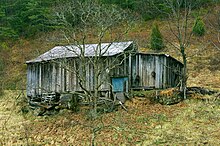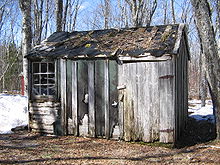Shack



A shack is a type of small house, usually in a state of disrepair. The word may derive from the Nahuatl (Aztec) word xacalli or "adobe house" by way of Mexican Spanish xacal/jacal, which has the same meaning as "shack".[1] It was a common usage among people of Mexican ancestry throughout the U.S. southwest and was picked up by speakers of American English.
An alternative etymology is that shack derives from teach, pronounced chaċ, meaning "house" in Irish Gaelic, which was absorbed into American English from the 1880s onwards. Similarly shanty may have derived from the Gaelic seantigh, prounced shan-tí, meaning "old house", at a time when Irish migrants lived in New York's tenements.[2]
It is possible that up to a billion people worldwide live in shacks.[3] Fire is a key hazard in shack settlements.[4] Shack settlements are also sometimes known as slums or shanty towns.
In Australia, particularly in Tasmania,[5] shacks were originally holiday homes or recreational fishing shelter located on crown land such as beside lakes, along on river banks (especially the Murray River) or near beaches. They were sometimes roughly built but were often quite solid structures where they had to withstand the inclement weather of highland areas. Frequently they had no legal title to the land they were built on. Now, a lot of the shack owners have freehold title to their land, and are subject to building codes to reduce the risk of damage or injury from floods and storms. Many are now quite grand holiday homes and summer houses. There are also fishermen's shacks at places like Wedge-Grey on the Western Australian coast. The New Zealand equivalent is called a bach.
In South Africa, shacks (also referred to as mikhukhu or imijondolo[6]), typically constructed with corrugated iron sheets cladding a wooden frame, are an increasingly common form of accommodation for millions of people and are mostly found in or around urban areas, built particularly on the outskirts of larger cities. In recent years shack dwellers have organized major protests around the country.
Other meanings of the word
- In amateur radio jargon, a shack refers to the place where an amateur radio operator's radio sending and receiving apparatus is located and operated. The term originally meant that part of a ship where the radio apparatus was located and operated. This is the inspiration for the name 'RadioShack'.
- In military aviation jargon, a "shack" refers to a successful, direct hit on a ground target.
- Bus stops are often referred to as "shacks" by commuters and the common passerby because some bus stops have roofs on top of the stops for shade and protection from the rain.
References
- ^ http://www.bartleby.com/61/75/S0307500.html
- ^ Cassidy, D: "How the Irish invented Slang", page 5, 250, 252, CounterPunch Press, 2007, ISBN 978-1-904859-60-4
- ^ Planet of Slums, Verso, 2006
- ^ A Big Devil in the Jondolos: A report on shack fires by Matt Birkinshaw
- ^ Matthew Newton, Shack Life: Tasmanian shacks and shack culture (2003) ISBN 0-646-42878-0
- ^ http://www.azapo.org.za/publications/utlwangazapo.htm[dead link]
